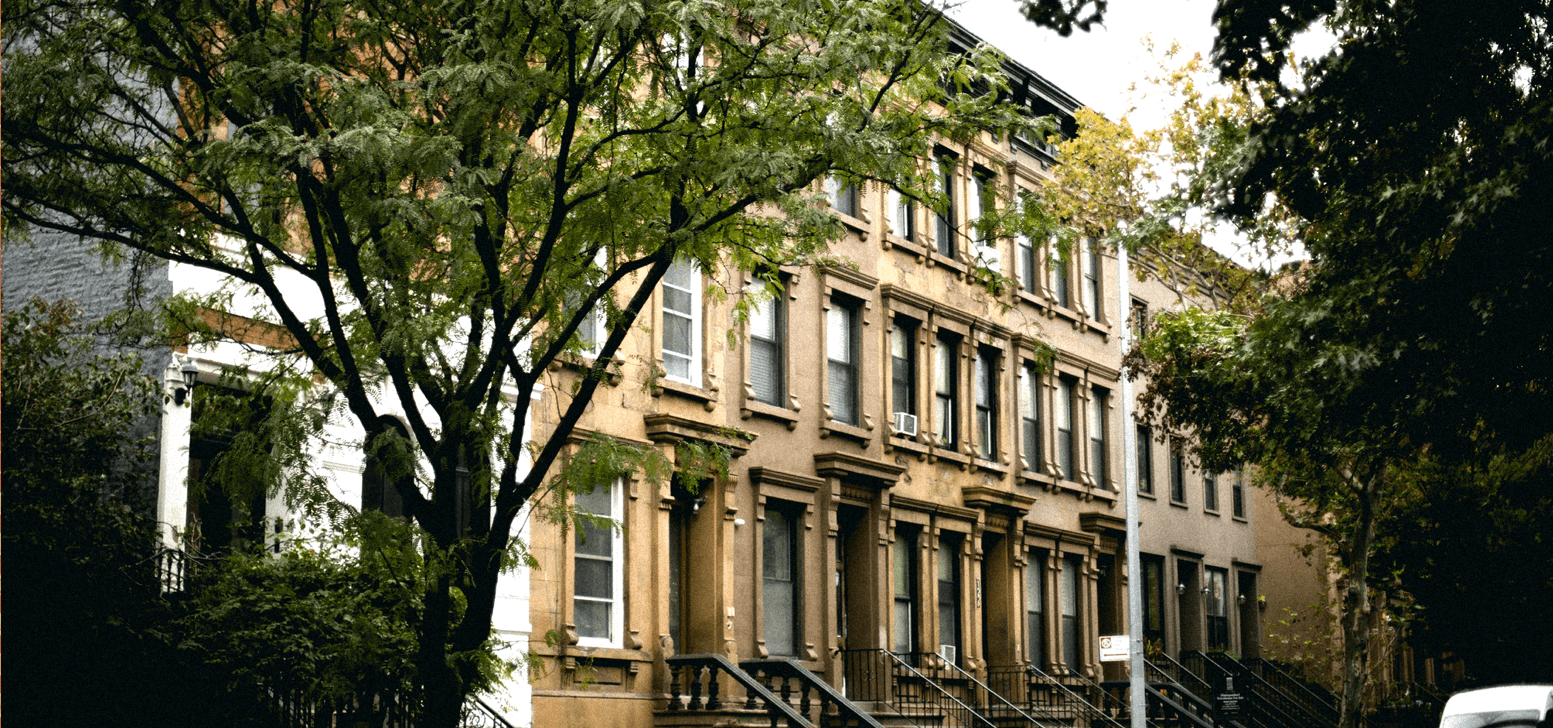Whether you own a brownstone in Brooklyn or a walk-up on the Upper East Side, when it comes to your homeowners insurance, empathy, speed, and trust matter.
Homeowners insurance financially buffers you, your family, and your stuff against bad things that could do some serious damage to your bank account. If a thief breaks into your home while you’re in the Caribbean or your grandma slips on your icy driveway, homeowners insurance has you covered.
What does New York homeowners insurance cover?
If you live in the Empire State, you know that summers are hot, winters are freezing, and seasonal storms are no joke so when it comes to your homeowners insurance coverage, you’ll want to protect your home from all sorts of potential risks and damage.
Dwelling
‘Dwelling coverage’ helps pay for damages to the structure of your home. So if your pipes burst next winter and damage your walls, or a windstorm blows over a tree and damages your home, you’re covered.
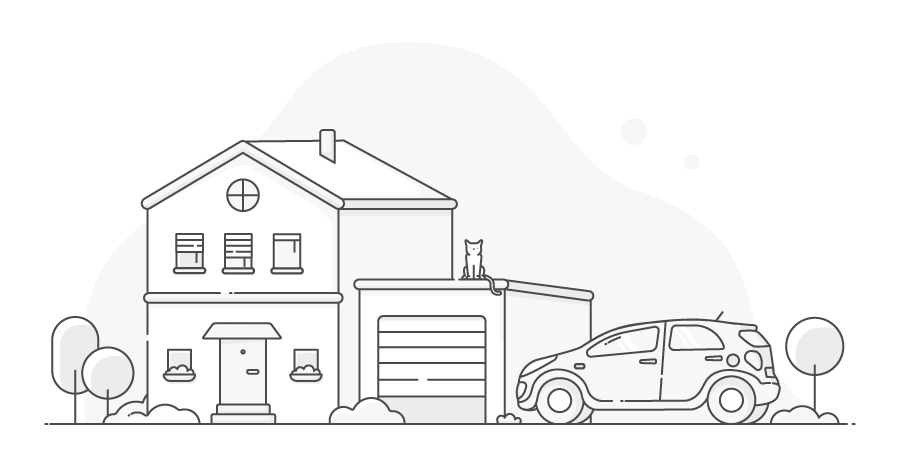
Other Structures
If one of the dangers mentioned above causes damage to your driveway, fence, shed, or other structures on your property, your homeowners insurance can help you out.
Loss of Use
If your place becomes uninhabitable due to covered damages, your ‘loss of use’ coverage can help pay for a temporary place to stay and basic living expenses such as food, laundry, parking, etc.
Personal Property
‘Personal property’ covers your stuff both inside and outside your home. So if your couch is ruined due to a burst pipe or your laptop is swiped at a coffee shop, homeowners insurance has your back.

Liability protection
If your neighbor slips and falls on an ice sheet on your driveway, you could be held liable. If someone is injured on your property, or anyone on your policy causes damage to someone else’s property or stuff, your insurance company should have you covered.
Medical Protection
If your neighbor needs to go to the hospital because of that slip and fall, your medical payments will kick in. Home insurance covers you if a guest gets injured at your place, or if you accidentally cause injury to someone outside your home.
How much is home insurance in New York?
According to Value Penguin, homeowners in New York pay around $969 per year on average for home insurance, compared to the national average of $2,151.
There’s no standard policy price when it comes to homeowners insurance. Your college friend who lives in Long Island will have a totally different price than your cousin who owns a penthouse on the Lower East Side.
| City | Average annual cost of homeowners insurance |
|---|---|
| New York | $2,495 |
| Buffalo | $1,100 |
| Rochester | $1,050 |
| Yonkers | $1,460 |
So, what variables impact your home insurance cost?
- Location of your home
If you live in a high-risk area for theft, fire, or windstorm, your policy will be pricier than it would be if you live in a low-risk area.
- Age of dwelling
If your home is brand new, you could get a discount on your homeowners insurance policy. However, old buildings are more likely to have structural issues or problems with the electrical or plumbing systems, which may hike up the price of your insurance a bit.
- Protective devices
If you have a fire alarm you could get a discount on your homeowners insurance. That’s because they’ll allow you to prevent a fire before it becomes an issue.
- Amount of insurance
The cost to rebuild your home has a big impact on the price of your policy. If your home is on the large side, or made of expensive materials, your home insurance policy might be a bit pricier.
- Deductible
The lower your deductible, the higher your homeowners insurance price. So choose a deductible that makes the most sense for your lifestyle.
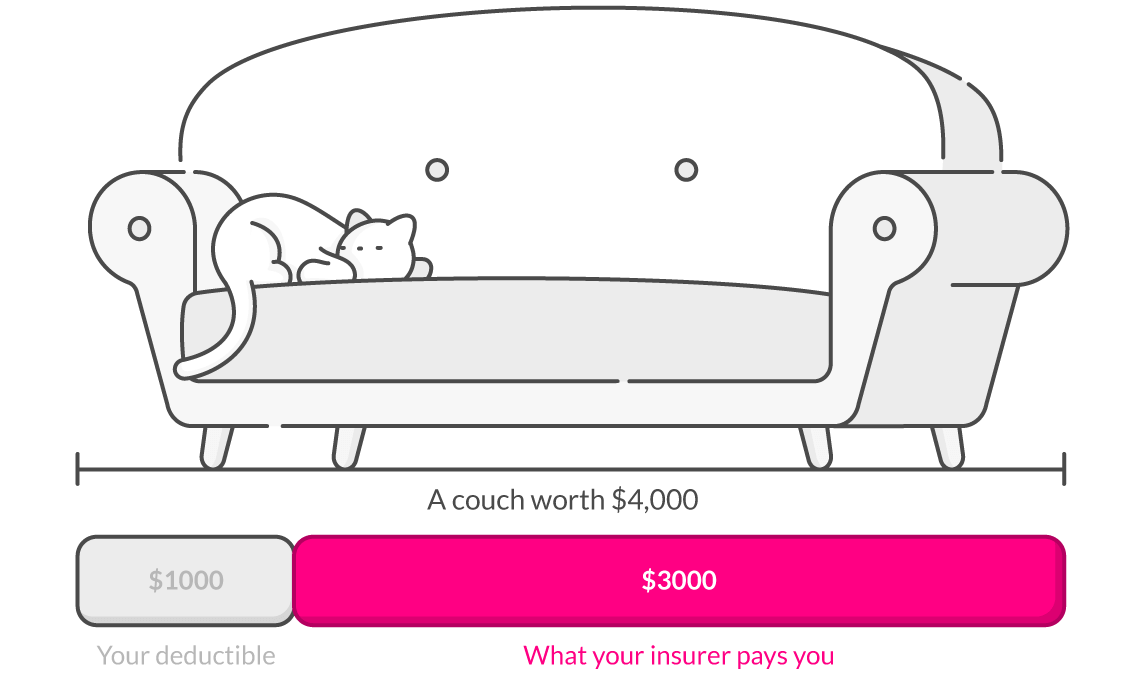
- Add-Ons
If you add your expensive jewelry or fine art or tack on water backup coverage to your policy, your price will go up a bit.
- Claims history
If you’ve never filed a claim, you’ll probably have a cheaper homeowners insurance policy than someone who has a history of filing claims.
Why get Lemonade homeowners insurance for New York?
Lemonade is powered by tech, so you can get a policy on the Lemonade app in less than 5 mins – zero paperwork, zero hassle.
If you ever need to file a claim, Lemonade can process them instantly, handling 30% in 3 seconds. Lemonade also does not use brokers, making each policy cheaper than competitors.
Lemonade was built differently than traditional insurance companies, who profit from the money they don’t pay out in claims. This means whenever they pay your claim, they lose profit. This is why getting your claims paid quickly and in full is sometimes so hard.

Lemonade takes a fixed fee out of your monthly payments, pays reinsurance (and some unavoidable expenses), and uses the rest for paying out claims. We treat premiums as if they were still your money, and return unclaimed remainders in our annual ‘Giveback’.
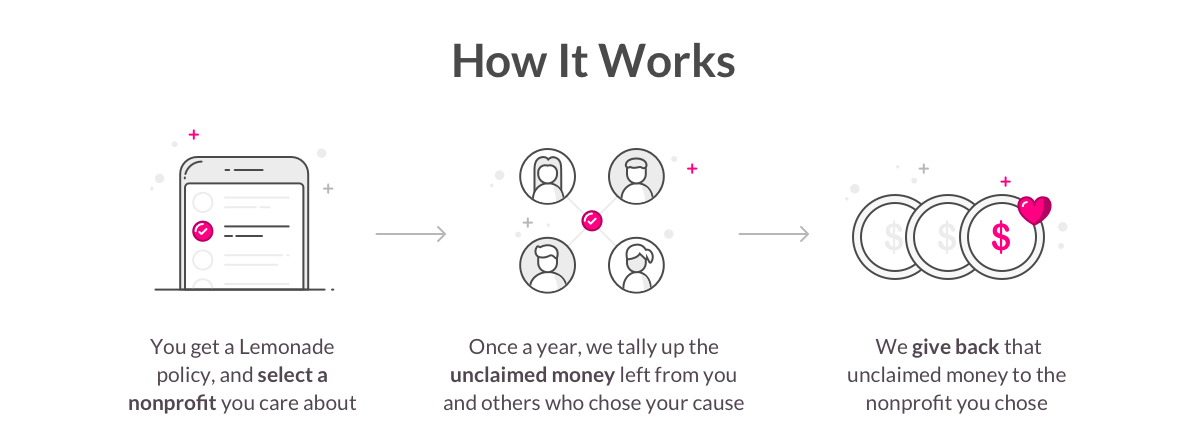
Giveback is a unique feature of Lemonade, where leftover money is donated to causes our policyholders care about each year.
How much home insurance do I need?
When it comes to home insurance, most people know they need it, but make the mistake of purchasing too little. Your home insurance comes with six broad areas of coverage, touching upon various scenarios having to do with damages and losses to your property/residence, yourself, and others. We’ll break that down in the sections to come, and how much coverage you need in each category, so you’re properly protected against every scenario. Read more here.
Dwelling coverage
Dwelling Coverage protects you from damages to your place (your home and everything attached to it, such as a garage, chimney, in-ground pool, etc.) When it comes to setting a dwelling coverage amount for your home, you don’t want to choose the purchase price or current market value. It should be the amount that it’d take to rebuild your home (as it was before the damage), known as “reconstruction costs.” This is what your insurance company will be reimbursing you for in the worst-case scenario that you have to rebuild.
Personal property coverage
Personal Property is insurance lingo for “your stuff” (bikes, laptops, TVs, etc.) To determine how much personal property coverage you should get, choose a limit between 50 – 75 percent of your dwelling coverage amount. If you don’t think this covers all your stuff (including your priciest purchases) look into the Extra Coverage option with your insurer. Extra Coverage, also known as scheduled personal property, this add-on covers everything listed on your base policy, plus additional types of accidental damage.
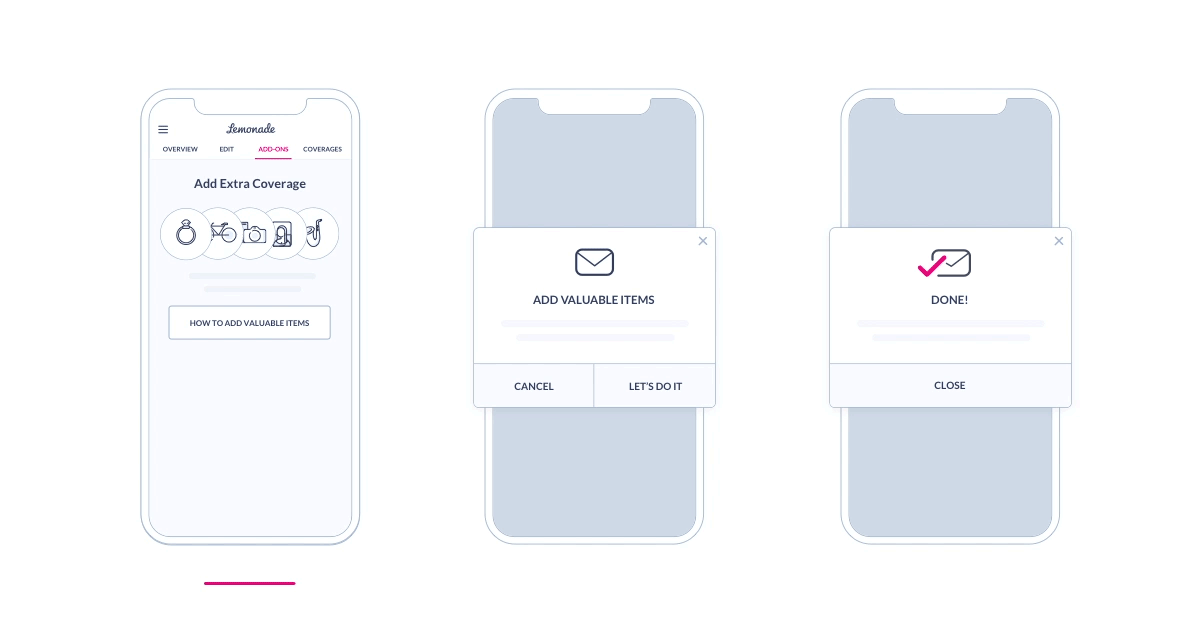
Loss of use coverage
Loss of Use helps with temporary living expenses if your place becomes unlivable due to a peril like a fire, mandatory evacuation, etc. Similar to personal property, additional expenses, or loss of use, is also based off of dwelling coverage. You should choose an amount that’s around 20-30 percent of your dwelling coverage. Also, take your lifestyle into consideration, as this covers what you’d usually spend on stuff like food, temporary storage of property, moving costs, etc. So let’s say you eat takeout everyday – breakfast, lunch, and dinner, you’ll most likely want to select an amount that’s more than someone who buys groceries and prepares their meals.
Personal liability coverage
Personal Liability refers to bodily injury or property damage to other people (or their stuff) as a result of your actions, at your home, and anywhere else. Personal liability, might just sound like legal fees, you may only think of the things we discussed above (injury to others, legal fees, etc.), but you should also take into account the total dollar amount of your financial assets, like your home, retirement accounts, investments, and anything else worth money. Your insurer’s liability coverage is also working to cover these things as well. If you don’t think $500K is enough, you can purchase something called an umbrella policy which will add another $1M or more in coverage.
Medical payments to others coverage
Let’s say a guest sprains her wrist after tripping on a rug in your living room, and she has hospital bills to pay. This is where your medical expenses coverage may kick in. You should generally choose between $1,000 – $5,000, but really depends on you. Try looking at how often you host and the safety of your home.
Home Insurance FAQ
Is homeowners insurance required?
While your state may not require homeowners insurance by law, your lender will almost always require coverage if you take out a mortgage to buy a home.
Consider scenarios, where you owe money on your mortgage and your home is destroyed – your homeowners insurance policy can have your back. So if you’ve ever wondered, ‘do I actually need homeowners insurance?’ Yes, you do!
What are the different types of homeowners insurance?
Lemonade offers two types of home insurance policies: one for single-family homes, (called HO3 in insurance-speak), and one for condos (HO6). There are minor differences between the two, and you’ll choose the right policy depending on the type of home you’re looking to insure. In a nutshell, whereas homeowners own and are responsible for everything on their property, (home, garage, fence, etc.), condo owners with HO6 policies are only responsible for the outermost walls of their unit, inward.
How can I save on homeowners insurance?
Homeowners insurance can get expensive, so you might be looking for ways to bring your premium down slightly.
First off, your home doesn’t need to be ‘smart’ in order to install devices that will help lower your insurance premium. Start with a standard fire alarm and burglar alarm, and you’ve already lowered your risks. And lowered risks equals lowered premiums.
Also, if you experience routine bad weather, ask your insurance company what kind of reinforcements you can add to make your home more weather-proof. For instance, you may be able to save money on your premiums by adding storm shutters or adding laminated glass windows. You could also replace your heating, plumbing, and electrical systems to cut down the risk of fire and water damage.
Lemonade has its own ‘Get Discounts Now’ feature, where you can help lower your premium by answering a series of questions about your home’s characteristics and safety measures like home renovations, or whether you live in a gated community.
Lastly, if you want your premium to go down, you can increase your deductible. The higher your deductible, the lower your premium, and vice versa.
No time to deal with papers and long forms? Check why Lemonade is the most loved and trusted insurance in New York
A few quick words, because we <3 our lawyers: This post is general in nature, and any statement in it doesn’t alter the terms, conditions, exclusions, or limitations of the policies issued, which differ according to your state of residence. You’re encouraged to discuss your specific circumstances with your own professional advisors. The purpose of this post is merely to provide you with info and insights you can use to make such discussions more productive! Naturally, all comments by, or references to, third parties represent their own views, and Lemonade assumes no responsibility for them. Coverage may not be available in all states. Please note that statements about coverages, policy management, claims processes, Giveback, and customer support apply to policies underwritten by Lemonade Insurance Company or Metromile Insurance Company, a Lemonade company, sold by Lemonade Insurance Agency, LLC. The statements do not apply to policies underwritten by other carriers.

